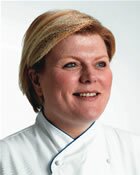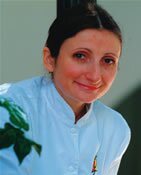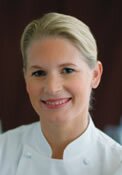Inflight Magazine of Brussels Airlines
Welcome to the Inflight Magazine of Brussels Airlines
A woman’s place
Despite our ability to furiously multi-task, there are still relatively few female chefs at the pinnacle of the restaurant business. Yet the status quo in this ultra-male industry is increasingly being challenged, says Sudi Pigott
 Earlier this year, there was much fanfare when Anne-Sophie Pic of Maison Pic in Varenne became the first French woman in over 50 years to be awarded three Michelin stars. But why all the fuss? In fact, there are plenty of Michelin-rated female chefs in Europe who have weighty culinary reputations. While their empire-building male counterparts busily court TV and other promotional opportunities, many of Europe’s most successful female chefs are simply content to run impeccable and – mostly – calmer kitchens, often continuing a family tradition while simultaneously raising one themselves.
Earlier this year, there was much fanfare when Anne-Sophie Pic of Maison Pic in Varenne became the first French woman in over 50 years to be awarded three Michelin stars. But why all the fuss? In fact, there are plenty of Michelin-rated female chefs in Europe who have weighty culinary reputations. While their empire-building male counterparts busily court TV and other promotional opportunities, many of Europe’s most successful female chefs are simply content to run impeccable and – mostly – calmer kitchens, often continuing a family tradition while simultaneously raising one themselves.
But do Europe’s top female chefs see themselves as being different from the men? Are they breaking the mould?
 Elena Arzak jointly runs the family’s three-Michelin-star Arzak restaurant in the Basque city of San Sebastian, near Bilbao, with her father, the legendary Juan Arzak. The restaurant has been in the family since 1897.
Elena Arzak jointly runs the family’s three-Michelin-star Arzak restaurant in the Basque city of San Sebastian, near Bilbao, with her father, the legendary Juan Arzak. The restaurant has been in the family since 1897.
Arzak sees nothing strange about a woman being in charge: “My grandmother, Francisca, was chef when I was small and she was very good. We Basques have a tradition of matriarchy. As a child I would sit enthralled in the kitchen for hours and my two-year-old daughter already enjoys the buzz.” Arzak insists that there was no family pressure to follow in her father’s footsteps; it was entirely her choice. She worked in top restaurants around Europe for six years before returning to work alongside her father in their laboratory-like kitchen.
 Elena describes the process: “We work just like my father and grandmother did. I present a dish and then we discuss it and refine it. According to my father, it’s like musical generations: he’s an old rocker and I’m heavy metal.” Her menu’s distinctive, unquestionably experimental style remains fundamentally Basque. “I am very influenced by my environment. What I love most is working with outstanding raw materials. I do a lot with spices, too, particularly star anise and powdered liquorice for both sweet and savoury dishes, and I like to introduce contrasting flavours and technique, but always respecting the ingredient’s own natural qualities.”
Elena describes the process: “We work just like my father and grandmother did. I present a dish and then we discuss it and refine it. According to my father, it’s like musical generations: he’s an old rocker and I’m heavy metal.” Her menu’s distinctive, unquestionably experimental style remains fundamentally Basque. “I am very influenced by my environment. What I love most is working with outstanding raw materials. I do a lot with spices, too, particularly star anise and powdered liquorice for both sweet and savoury dishes, and I like to introduce contrasting flavours and technique, but always respecting the ingredient’s own natural qualities.”
 Helena Puolokka is London’s newest female star and head chef of Skylon restaurant in the iconic Festival Hall on the South Bank, which re-opened to rave reviews earlier this summer. “You have to have the balls and be very single-minded to work in what is unquestionably a tough environment with unsociable hours,” affirms Puolokka, who has worked in the kitchens of revered chefs Pierre Gagnaire in Paris and Pierre Koffman in London, where “no allowances were made for being female”. He r cooking is ingredient-led: “Dishes evolve depending on what produce is best at market. For example I love to cook butter-poached lobster whether with broad beans or later in the season with cepes,” she explains.
Helena Puolokka is London’s newest female star and head chef of Skylon restaurant in the iconic Festival Hall on the South Bank, which re-opened to rave reviews earlier this summer. “You have to have the balls and be very single-minded to work in what is unquestionably a tough environment with unsociable hours,” affirms Puolokka, who has worked in the kitchens of revered chefs Pierre Gagnaire in Paris and Pierre Koffman in London, where “no allowances were made for being female”. He r cooking is ingredient-led: “Dishes evolve depending on what produce is best at market. For example I love to cook butter-poached lobster whether with broad beans or later in the season with cepes,” she explains.
 “It’s not close to my heart to use too many super-technical methods. Rather, I’m keen to gradually bring the Finnish influences of my family background into my cooking.” Puolokka likes to work with other women in the kitchen because they are “very responsive and good at achieving a sense of balance”.
“It’s not close to my heart to use too many super-technical methods. Rather, I’m keen to gradually bring the Finnish influences of my family background into my cooking.” Puolokka likes to work with other women in the kitchen because they are “very responsive and good at achieving a sense of balance”.
Anne-Sophie Pic of Maison Pic in Valence near Lyon recalls that in her early days, training under her father was very tough: “I had to fight because I was both the daughter of the boss and a woman.” Pic agrees that mental strength and attitude are as important as a chef’s physical attributes, especially since there is not so much gruelling heavy lifting in a modern kitchen. “Screaming and swearing is an odd way of getting through to people and suggests something is wrong,” she says. “In my kitchen the atmosphere is simply very concentrated. Women may have a different sensibility from men in cuisine, but we share the same goal of excellence.” Nor does Pic shy away from the highly technical, although her cooking is fresh and delicate too. “I have always done everything possible to be technically strong. It became a way of showing those who mocked me that I could make it.”
However, Pic is not being disingenuous when she emphasises: “I don’t feel the lure of pushing my character in the media. I’m more interested in expressing myself through the food, how my cooking affects my customers, and upholding the sense of family continuity. Of course, I look for originality too, but in combinations of flavours.”
 Tellingly, Cornelia Poletto, TV chef and chef-proprietor of Hamburg’s Michelin-starred Poletto, lives above the restaurant that she runs with her husband. “It means I can bring together cooking and raising a child, and don’t have to contend with a male boss with prejudices,” explains Poletto. “When I am troubled with guilt as a mother who works constantly, I have to remind myself that I need the creativity of cooking. I’m driven by my passion and wanting to present a positive role model of being a female chef in a country where I am still the exception.
Tellingly, Cornelia Poletto, TV chef and chef-proprietor of Hamburg’s Michelin-starred Poletto, lives above the restaurant that she runs with her husband. “It means I can bring together cooking and raising a child, and don’t have to contend with a male boss with prejudices,” explains Poletto. “When I am troubled with guilt as a mother who works constantly, I have to remind myself that I need the creativity of cooking. I’m driven by my passion and wanting to present a positive role model of being a female chef in a country where I am still the exception.
Perhaps that’s why Poletto is so provocative: “Women cook better than men definitely. We simply have finer taste buds.”
 Patricia Desmedt is the fourth-generation female chef-proprietor of ‘t Oud Konijntje in Waregem, close to Brussels. Desmedt insists: “I’ve never had anyone saying after tasting my food, ‘This is a woman’s kitchen’, but I admit I may work differently in the kitchen and put more of my personality and feeling into my cooking.” But what’s most important to Desmedt, and this seems a universal female priority in the kitchen – arguably sometimes forgotten in the quest for accolades and wealth – is: “Continuing the guiding principle of my mother: to provide pleasure in eating.”
Patricia Desmedt is the fourth-generation female chef-proprietor of ‘t Oud Konijntje in Waregem, close to Brussels. Desmedt insists: “I’ve never had anyone saying after tasting my food, ‘This is a woman’s kitchen’, but I admit I may work differently in the kitchen and put more of my personality and feeling into my cooking.” But what’s most important to Desmedt, and this seems a universal female priority in the kitchen – arguably sometimes forgotten in the quest for accolades and wealth – is: “Continuing the guiding principle of my mother: to provide pleasure in eating.”
FR La place de la femme
Les femmes chefs sont encore sousreprésentées au pinacle de l’industrie de la restauration. En comparaison de leurs homologues masculins qui s’affairent constamment pour se placer sous les feux de l’actualité, la plupart des chefs femmes les plus réputées sont très heureuses de gérer leur cuisine dans le calme, loin du tapage médiatique.
Helena Puolokka, à Londres, est à la tête du restaurant Skylon. “Vous devez vraiment avoir la carrure et l’état d’esprit ad hoc pour travailler dans un environnement incontestablement exigeant, avec des horaires peu accommodants,” affirme Puolokka.
Cela a fait beaucoup de bruit lorsque Anne-Sophie Pic de la Maison Pic à Varenne fut la première femme française étoilée au Michelin (trois étoiles). “Dans ma cuisine règne une atmosphère de grande concentration, tout simplement. Les femmes ont sans doute une sensibilité très différente des hommes, mais nous partageons le même objectif d’excellence.”
Elena Arzak co-dirige avec son père Juan, le restaurant familial Arzak, trois étoiles au Michelin, à San Sebastian près de Bilbao et elle ne voit rien d’anormal à ce qu’une femme soit aux commandes. “Lorsque j’étais enfant, ma grand-mère était chef et elle excellait dans ce rôle. Nous les Basques, avons une tradition matriarcale.”
Cornelia Poletto, vedette d’une émission télévisée, fait aussi tourner son propre restaurant étoilé au Michelin, Poletto, à Hambourg, assistée de son mari. “Cela veut dire que je peux mener de front la cuisine et l’éducation d’un enfant, et que je ne dois pas me confronter aux préjugés d’un supérieur masculin,” explique Poletto.
Patricia Desmedt appartient à la quatrième génération de chefs du ‘t Oud Konijntje à Waregem, Belgique. Desmedt insiste, “Après avoir goûté mes plats, je n’ai jamais entendu dire que c’était préparé par une femme, mais je peux admettre que je travaille différemment, et que je mets plus de sensibilité dans ma façon de cuisiner.”
NL Vrouwen toegelaten
De restaurantsector telt nog steeds weinig vrouwelijke chefs. Terwijl hun mannelijke tegenhangers voortdurend uit zijn op promotie, laten Europa’s meest succesvolle vrouwelijke chefs dergelijk ‘haantjesgedrag’ aan zich voorbijgaan.
Helena Puolokka is chef-kokkin van het Londense Skylon-restaurant. “Je moet ballen aan je lijf hebben en vastberaden zijn om in zo’n meedogenloos milieu met onmogelijke uren te werken”, aldus Puolokka.
Toen Anne-Sophie Pic van Maison Pic in Varenne als eerste vrouw drie Michelin-sterren kreeg, zorgde dat voor flink wat deining. “In mijn keuken is iedereen gewoon erg geconcentreerd. Vrouwen ervaren de dingen misschien anders, maar we streven naar dezelfde topkwaliteit.”
In San Sebastian, nabij Bilbao, leidt Elena Arzak samen met haar vader het driesterrenrestaurant Arzak. Dat een vrouw de touwtjes in handen heeft, vindt ze heel normaal. “Mijn grootmoeder was chef toen ik klein was, en dat deed ze heel goed. In het Baskenland hebben vrouwen altijd al een dominante rol gespeeld.”
Tv-chef Cornelia Poletto leidt samen met haar man het met Michelin-sterren bekroonde Hamburgse restaurant Poletto. “Hier kan ik koken én voor mijn kinderen zorgen, zonder dat ik last heb van een baas met vooroordelen”, aldus Poletto.
Patricia Desmedt is chef van de vierde generatie van ‘t Oud Konijntje in Waregem. “Naar mijn weten heeft nog nooit iemand een onderscheid gemaakt tussen mijn keuken en die van een man, alhoewel ik misschien wel anders en vooral met meer gevoel te werk ga”, vertrouwt ze ons toe.
Leave a Reply
